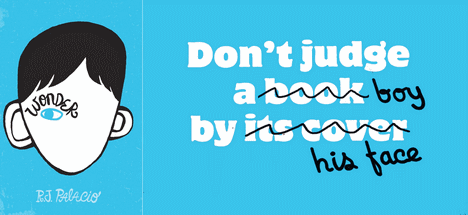Wonder – a desire or be curious to know something (v). As a noun, wonder is defined as a feeling of “surprise mingled with admiration, caused by something beautiful, unexpected, unfamiliar, or inexplicable.” That is kind of how I see our Head of English. I certainly admire her dedication to teaching (we are very lucky to have her) and she sometimes surprises me. It was Freya that encouraged me to read ‘Wonder’ plus it is on our new English corridor mural of the 100 best reads (I am aiming to have read 50 by next September).
I am only disappointed, as my Y7 class do not get the opportunity to read it (it is afterall a little long). The book is wonderful in its own right, though the themes of attending / changing school, school hierarchy, bullying and friendship, losing a loved one (grans or Daisy the dog) academic endeavour and courage are hugely powerful; making Wonder a fantastic class reader. Then there is the multi-person viewpoint of the same storyline, giving you the opportunity to revisit social situations from different perspectives (think SUMO and the beach ball colours analogy) and finally the wonderfully crafted, slow release clues of Auggie’s craniofacial abnormality; intrigue ruffling along beneath the storyline.
I won’t describe what I look like. Whatever you’re thinking, it’s probably worse. – August Pullman

Yet, what makes Wonder it even more wonderful, is that Auggie is such a marvellous character, with an equally impressive supporting cast, notably Summer, Jack and Mr Tushman. I think I have said enough.
For schools and teachers (and English teachers in particular), the final reason Wonder would make a fantastic school investment is that August’s character manages to get the reader to assess their own behaviour. August is hyper-alert to how other people (particularly adults for some reason) respond to him, right down to their microexpressions. August shares these encounters with the reader and it is Augusts inner-dialogue that flips the emotional perspective. Instead I empathising with August, I found myself considering how I would respond, were I meeting Auggie for the first time? How would you respond? How would students think they respond? How would they respond in the throws of hierarchical teenage school life? How would they like to respond?
There are a fair few interviews with debutant author RJ Palacio and some resources (though not many) on her website.
[qr_code_display]


